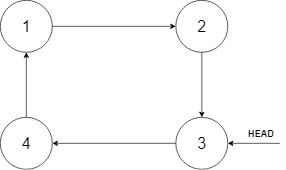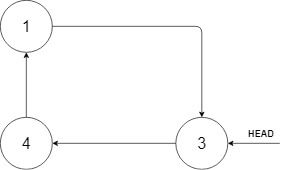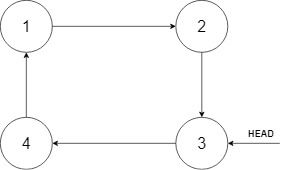| comments | difficulty | edit_url | tags | |
|---|---|---|---|---|
true |
Medium |
|
Given a Circular Linked List node, which is sorted in non-descending order, write a function to insert a value insertVal into the list such that it remains a sorted circular list. The given node can be a reference to any single node in the list and may not necessarily be the smallest value in the circular list.
If there are multiple suitable places for insertion, you may choose any place to insert the new value. After the insertion, the circular list should remain sorted.
If the list is empty (i.e., the given node is null), you should create a new single circular list and return the reference to that single node. Otherwise, you should return the originally given node.
Example 1:
Input: head = [3,4,1], insertVal = 2 Output: [3,4,1,2] Explanation: In the figure above, there is a sorted circular list of three elements. You are given a reference to the node with value 3, and we need to insert 2 into the list. The new node should be inserted between node 1 and node 3. After the insertion, the list should look like this, and we should still return node 3.
Example 2:
Input: head = [], insertVal = 1
Output: [1]
Explanation: The list is empty (given head is null). We create a new single circular list and return the reference to that single node.
Example 3:
Input: head = [1], insertVal = 0 Output: [1,0]
Constraints:
- The number of nodes in the list is in the range
[0, 5 * 104]. -106 <= Node.val, insertVal <= 106
"""
# Definition for a Node.
class Node:
def __init__(self, val=None, next=None):
self.val = val
self.next = next
"""
class Solution:
def insert(self, head: 'Optional[Node]', insertVal: int) -> 'Node':
node = Node(insertVal)
if head is None:
node.next = node
return node
prev, curr = head, head.next
while curr != head:
if prev.val <= insertVal <= curr.val or (
prev.val > curr.val and (insertVal >= prev.val or insertVal <= curr.val)
):
break
prev, curr = curr, curr.next
prev.next = node
node.next = curr
return head/*
// Definition for a Node.
class Node {
public int val;
public Node next;
public Node() {}
public Node(int _val) {
val = _val;
}
public Node(int _val, Node _next) {
val = _val;
next = _next;
}
};
*/
class Solution {
public Node insert(Node head, int insertVal) {
Node node = new Node(insertVal);
if (head == null) {
node.next = node;
return node;
}
Node prev = head, curr = head.next;
while (curr != head) {
if ((prev.val <= insertVal && insertVal <= curr.val)
|| (prev.val > curr.val && (insertVal >= prev.val || insertVal <= curr.val))) {
break;
}
prev = curr;
curr = curr.next;
}
prev.next = node;
node.next = curr;
return head;
}
}/*
// Definition for a Node.
class Node {
public:
int val;
Node* next;
Node() {}
Node(int _val) {
val = _val;
next = NULL;
}
Node(int _val, Node* _next) {
val = _val;
next = _next;
}
};
*/
class Solution {
public:
Node* insert(Node* head, int insertVal) {
Node* node = new Node(insertVal);
if (!head) {
node->next = node;
return node;
}
Node *prev = head, *curr = head->next;
while (curr != head) {
if ((prev->val <= insertVal && insertVal <= curr->val) || (prev->val > curr->val && (insertVal >= prev->val || insertVal <= curr->val))) break;
prev = curr;
curr = curr->next;
}
prev->next = node;
node->next = curr;
return head;
}
};/**
* Definition for a Node.
* type Node struct {
* Val int
* Next *Node
* }
*/
func insert(head *Node, x int) *Node {
node := &Node{Val: x}
if head == nil {
node.Next = node
return node
}
prev, curr := head, head.Next
for curr != head {
if (prev.Val <= x && x <= curr.Val) || (prev.Val > curr.Val && (x >= prev.Val || x <= curr.Val)) {
break
}
prev, curr = curr, curr.Next
}
prev.Next = node
node.Next = curr
return head
}
